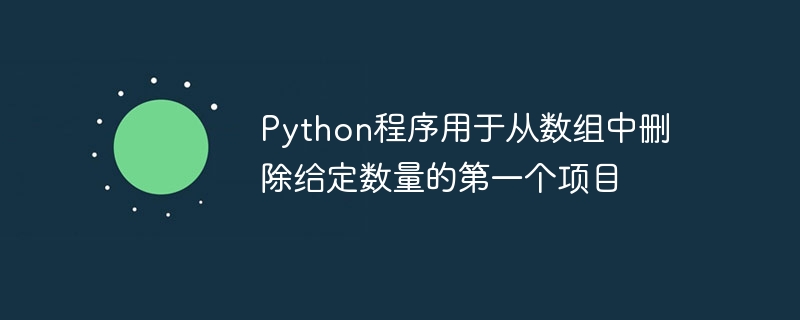Python程序用于从数组中删除给定数量的第一个项目

数组是一种数据结构,用于存储一组相同数据类型的元素。数组中的每个元素都由索引值或键来标识。
Python 中的数组
Python 没有原生的数组数据结构。相反,我们可以使用List数据结构来表示数组。
[1, 2, 3, 4, 5]
我们还可以使用数组或 NumPy 模块来处理 Python 中的数组。由 array 模块定义的数组是 -
array('i', [1, 2, 3, 4])
由 NumPy 模块定义的 Numpy 数组是 -
array([1, 2, 3, 4])
Python索引是从0开始的。以上所有数组的索引都是从0开始到(n-1)。
输入输出场景
假设我们有一个包含 5 个元素的整数数组。在输出数组中,前几个元素将被删除。
Input array: [1, 2, 3, 4, 5] Output: [3, 4, 5]
前 2 个元素 1、2 将从输入数组中删除。
在本文中,我们将了解如何从数组中删除第一个给定数量的项目。这里我们主要使用python切片来去除元素。
Python 中的切片
切片允许一次访问多个元素,而不是使用索引访问单个元素。
语法
iterable_obj[start:stop:step]
哪里,
Start:对象切片开始的起始索引。默认值为 0。
End:对象切片停止处的结束索引。默认值为 len(object)-1。
步长:增加起始索引的数字。默认值为 1。
使用列表
我们可以使用列表切片从数组中删除第一个给定数量的元素。
示例
让我们举个例子,应用列表切片来删除数组中的第一个元素。
# creating array
lst = [1, 2, 3, 4, 5, 6, 7, 8, 9, 10]
print ("The original array is: ", lst)
print()
numOfItems = 4
# remove first elements
result = lst[numOfItems:]
print ("The array after removing the elements is: ", result)
输出
The original array is: [1, 2, 3, 4, 5, 6, 7, 8, 9, 10] The array after removing the elements is: [5, 6, 7, 8, 9, 10]
从给定数组中删除前 4 个元素,并将结果数组存储在结果变量中。在此示例中,原始数组保持不变。
示例
通过使用 python del 关键字和切片对象,我们可以删除数组的元素。
# creating array
lst = [1, 2, 3, 4, 5, 6, 7, 8, 9, 10]
print ("The original array is: ", lst)
print()
numOfItems = 4
# remove first elements
del lst[:numOfItems]
print ("The array after removing the elements is: ", lst)
输出
The original array is: [1, 2, 3, 4, 5, 6, 7, 8, 9, 10] The array after removing the elements is: [5, 6, 7, 8, 9, 10]
语句 lst[:numOfItems] 检索数组中第一个给定数量的项目,del 关键字删除这些项目/元素。
使用 NumPy 数组
使用 numpy 模块和切片技术,我们可以轻松地从数组中删除项目数。
示例
在此示例中,我们将从 numpy 数组中删除第一个元素。
import numpy
# creating array
numpy_array = numpy.array([1, 3, 5, 6, 2, 9, 8])
print ("The original array is: ", numpy_array)
print()
numOfItems = 3
# remove first elements
result = numpy_array[numOfItems:]
print ("The result is: ", result)
输出
The original array is: [1 3 5 6 2 9 8] The result is: [6 2 9 8]
我们已经使用数组切片成功从 numpy 数组中删除了前 2 个元素。
使用数组模块
Python 中的数组模块还支持索引和切片技术来访问元素。
示例
在此示例中,我们将使用 array 模块创建一个数组。
import array
# creating array
arr = array.array('i', [2, 1, 4, 3, 6, 5, 8, 7])
print ("The original array is: ", arr)
print()
numOfItems = 2
# remove first elements
result = arr[numOfItems:]
print ("The result is: ", result)
输出
The original array is: array('i', [2, 1, 4, 3, 6, 5, 8, 7])
The result is: array('i', [4, 3, 6, 5, 8, 7])
结果数组已从数组 arr 中删除了前 2 个元素,此处数组 arr 未更改。
以上是Python程序用于从数组中删除给定数量的第一个项目的详细内容。更多信息请关注PHP中文网其他相关文章!

热AI工具

Undresser.AI Undress
人工智能驱动的应用程序,用于创建逼真的裸体照片

AI Clothes Remover
用于从照片中去除衣服的在线人工智能工具。

Undress AI Tool
免费脱衣服图片

Clothoff.io
AI脱衣机

Video Face Swap
使用我们完全免费的人工智能换脸工具轻松在任何视频中换脸!

热门文章

热工具

记事本++7.3.1
好用且免费的代码编辑器

SublimeText3汉化版
中文版,非常好用

禅工作室 13.0.1
功能强大的PHP集成开发环境

Dreamweaver CS6
视觉化网页开发工具

SublimeText3 Mac版
神级代码编辑软件(SublimeText3)
 PHP和Python:解释了不同的范例
Apr 18, 2025 am 12:26 AM
PHP和Python:解释了不同的范例
Apr 18, 2025 am 12:26 AM
PHP主要是过程式编程,但也支持面向对象编程(OOP);Python支持多种范式,包括OOP、函数式和过程式编程。PHP适合web开发,Python适用于多种应用,如数据分析和机器学习。
 在PHP和Python之间进行选择:指南
Apr 18, 2025 am 12:24 AM
在PHP和Python之间进行选择:指南
Apr 18, 2025 am 12:24 AM
PHP适合网页开发和快速原型开发,Python适用于数据科学和机器学习。1.PHP用于动态网页开发,语法简单,适合快速开发。2.Python语法简洁,适用于多领域,库生态系统强大。
 Python vs. JavaScript:学习曲线和易用性
Apr 16, 2025 am 12:12 AM
Python vs. JavaScript:学习曲线和易用性
Apr 16, 2025 am 12:12 AM
Python更适合初学者,学习曲线平缓,语法简洁;JavaScript适合前端开发,学习曲线较陡,语法灵活。1.Python语法直观,适用于数据科学和后端开发。2.JavaScript灵活,广泛用于前端和服务器端编程。
 vs code 可以在 Windows 8 中运行吗
Apr 15, 2025 pm 07:24 PM
vs code 可以在 Windows 8 中运行吗
Apr 15, 2025 pm 07:24 PM
VS Code可以在Windows 8上运行,但体验可能不佳。首先确保系统已更新到最新补丁,然后下载与系统架构匹配的VS Code安装包,按照提示安装。安装后,注意某些扩展程序可能与Windows 8不兼容,需要寻找替代扩展或在虚拟机中使用更新的Windows系统。安装必要的扩展,检查是否正常工作。尽管VS Code在Windows 8上可行,但建议升级到更新的Windows系统以获得更好的开发体验和安全保障。
 vscode 扩展是否是恶意的
Apr 15, 2025 pm 07:57 PM
vscode 扩展是否是恶意的
Apr 15, 2025 pm 07:57 PM
VS Code 扩展存在恶意风险,例如隐藏恶意代码、利用漏洞、伪装成合法扩展。识别恶意扩展的方法包括:检查发布者、阅读评论、检查代码、谨慎安装。安全措施还包括:安全意识、良好习惯、定期更新和杀毒软件。
 visual studio code 可以用于 python 吗
Apr 15, 2025 pm 08:18 PM
visual studio code 可以用于 python 吗
Apr 15, 2025 pm 08:18 PM
VS Code 可用于编写 Python,并提供许多功能,使其成为开发 Python 应用程序的理想工具。它允许用户:安装 Python 扩展,以获得代码补全、语法高亮和调试等功能。使用调试器逐步跟踪代码,查找和修复错误。集成 Git,进行版本控制。使用代码格式化工具,保持代码一致性。使用 Linting 工具,提前发现潜在问题。
 PHP和Python:深入了解他们的历史
Apr 18, 2025 am 12:25 AM
PHP和Python:深入了解他们的历史
Apr 18, 2025 am 12:25 AM
PHP起源于1994年,由RasmusLerdorf开发,最初用于跟踪网站访问者,逐渐演变为服务器端脚本语言,广泛应用于网页开发。Python由GuidovanRossum于1980年代末开发,1991年首次发布,强调代码可读性和简洁性,适用于科学计算、数据分析等领域。
 vscode怎么在终端运行程序
Apr 15, 2025 pm 06:42 PM
vscode怎么在终端运行程序
Apr 15, 2025 pm 06:42 PM
在 VS Code 中,可以通过以下步骤在终端运行程序:准备代码和打开集成终端确保代码目录与终端工作目录一致根据编程语言选择运行命令(如 Python 的 python your_file_name.py)检查是否成功运行并解决错误利用调试器提升调试效率






